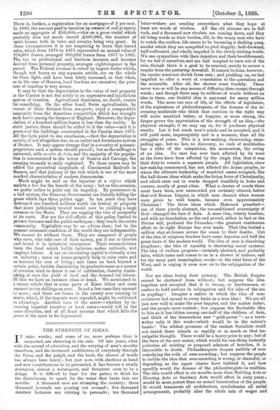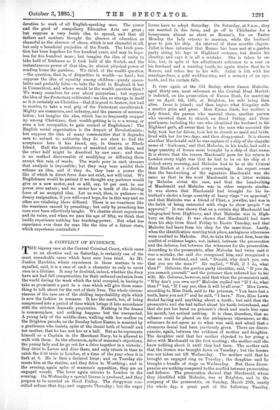THE STRENGTH OF IDEAS.
IT rains words ; and some of us, more perhaps than is suspected, are shivering in the rain. Of late years, what with the spread of education, and the untying of men's months therefrom, and the increased audibleness of everybody through the Press, and the pulpit, and the book, the shower of words has always been heavy ; but just now, with elections at hand and new constituencies to be persuaded, it has become a steady downpour, almost a waterspout, and threatens soon to be a deluge. It is difficult to hear for the patter, to think for the disturbance, to speak for the water that beats into our months. A thousand men are stumping the country; three thousand journals are pouring out counsel ; five thousand amateur lecturers are striving to persuade ; ten thousand
latter-writers are sending everywhere what they hope at least are words of wisdom. All the old streams are in full rush, and a thousand new rivulets are coming down, and they all bring words as their burden, till, to the weary men who have to watch the outflow, life seems to be becoming a shaking quag, amidst which they are compelled to plod sloppily, half-drowned, half-suffocated, and wholly impeded in the slowly sinking words. We can sympathise with their dejection and their bewilderment, for we feel it ourselves, and are half tempted to turn out of the rain, though there is a goal to be reached, merely to secure a respite from the pattering downfall. It cannot be done, however ; the carrier must not shrink from rain ; and plodding on, we feel impelled to offer a word of consolation to the querulous and the miserable. After all, the shower must fructify. There never was or will be any means of diffusing ideas except through words ; and though there may be millions of words without an idea in them, one fruitful idea is payment for many million words. The more one sees of life, of the efforts of legislators, of the aspirations of philanthropists, of the dreams of the in- creasing multitude who think that coercion in the right way will make mankind better, or happier, or more strong, the deeper grows the appreciation of the strength of an idea,—the physical strength, if we may say so, for it produces physical results. Let it but reach men's minds and be accepted, and it will yield more, imperceptibly and in a moment, than all the struggles of years. This is a law-making, discovering, stam- peding age; but no law, no discovery, no rush of multitudes, has a tithe of the compulsion, the momentum, the swing of an idea. No race has ever been affected by its wars as the Jews have been affected by the single idea that it was their duty to remain a separate people. All legislation, since law-making commenced, has not affected the Aryan peoples, to whom the ultimate leadership of mankind seems assigned, like the half-dozen ideas which make the living force of Christianity, and which stole out in words dropped stealthily in holes and corners, mostly of great cities. What a shower of words there must have been, now unrecorded yet certainly uttered, before that evil Roman Empire, in which men cheered when women were given to wild beasts, became even approximately Christian ! The three ideas which Mahomet preached— one of them purely abstract, the unconditioned sovereignty of God—changed the face of Asia. A mere idea, utterly baseless, and with no foundation, as the end proved, either in fact or the Divine will, produced the Crusades,—the greatest continuous effort to do right Europe has ever made. That idea hurled a million stay-at-homes across the ocean to their deaths. Out of the idea of religions freedom have come America and half the great facts of the modern world. The idea of race is dissolving kingdoms ; the idea of equality is shattering social systems. The idea of endless progress—certainly abstract, and probably false, which came and comes to us in a shower of tedious, and for the most part meaningless, words—is the vital force of the West, and is urging it even now on to the subjugation of the world.
Nor are ideas losing their potency. The British Empire cannot be shattered from without ; but suppose the idea begotten and accepted that it is wrong, or burdensome, or useless to hold nations in subjugation and the isles of the sea is. pupilage ! Imagine a nation in which the idea of non. resistance had spread to every brain as a true idea! We are all just now wild to make the poor happier, and the nation richer, and the people more content ; but suppose the Rechabite idea to bite as it has bitten among one-half of the children of Asia, and think of the tremendous new "gold-power "—as a tract- writer calls it this week—which would be in the nation's hands ! The wildest promises of the rashest Socialists could not enrich these islands so rapidly or so mach as that im- palpable thought. There would be a heavy price to pay; but of the force of the new motor, which would for one thing instantly pulverise all misting or proposed schemes of taxation, it is impossible to doubt. Philanthropists despair audibly of ever remedying the evils of over-crowding; but suppose the people to imbibe the idea that over-crowding is wrong, or shameful, or degrading, as the upper classes have imbibed it, and how speedily would the dreams of the philanthropists be realities. The idea would effect in six months more than Building Acts or Housing Acts or Sanitary Acts would effect in sixty years ; would be more potent than an armed insurrection of the people. It would transmute all architecture, revolutionise all social arrangements, probably alter the whole rate of wages and
devotion to work of all English-speaking men. The power and the good of compulsory Education Acts are great ; but suppose a very feeble idea to spread, and that all fathers and mothers thought the absence of education as shameful as the absence of shoes, which is not shameful at all, but only a beneficial prejudice of the North. The Irish ques- tion has been hopeless for five hundred years, and may be hope- less for five hundred more ; but imagine the idea of unity to take hold of 'Irishmen as it took hold of the Scotch, and the instantaneous power of that idea, its almost physical power of sending home the garrison. We think of the wealth question —the question, that is, of disparities in wealth—as hard ; but suppose the idea of equality among children—purely specu- lative and probably false—to take the hold in England it has in Connecticut, and where would be the wealth question then ? We weary ourselves for ever about pauperism ; but suppose the idea of the Protestant cultivated—an idea as strange in itself as it is certainly un-Christian—that it is good to bestow, but bad to receive, to take a real grip of the Protestant uncultivated. Mighty are commerce, and industry, and the passion of accumu- lation; but imagine the idea, which has so frequently cropped up among Christians, that wealth-getting is in ae a wrong, or even a low occupation, to gain control of Englishmen ! The English social organisation is the despair of Revolutionists ; but suppose the idea of many communities that it degrades men to submit to authority they do not elect to find the acceptance here it has found, say, in Geneva or Rhode Island. Half the institutions of mankind rest on ideas, and the other half might be dissolved by new ones ; and there is no method discoverable of modifying or diffusing them except this rain of words. The words pour in such streams that analysis is impossible ; but they may bear amidst their volume an idea, and if they do, they bear a power the like of which in direct force does not exist, nor will exist. We Englishmen would be patient if we thought any patience would give us a new motor, and so add, say, 10 per cent, to our power over nature ; and no motor has a tenth of the driving force of an accepted idea. Let us wait, then, in patience—in dreary resignation, if you will—and hope, for in this way and no other are vitalising ideas diffused. There is no weariness like the weariness caused by preaching; but only by preaching has man ever been effectively taught. We chatter about experience and its value, and when we pass the age of fifty, we think that beside experience nothing has teaching-power. But what has experience ever done for man like the idea of a future state, which experience contradicts ?















































 Previous page
Previous page